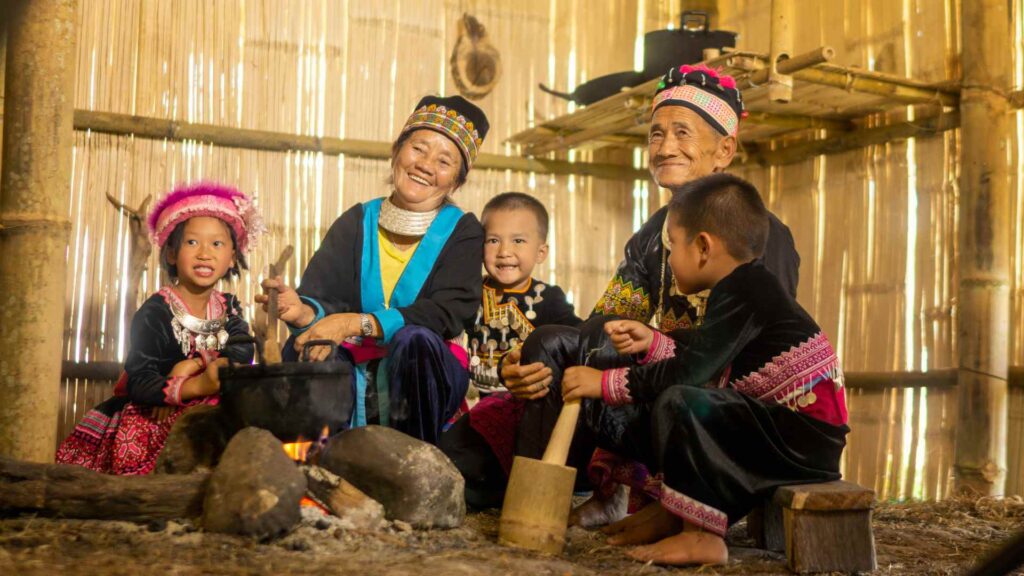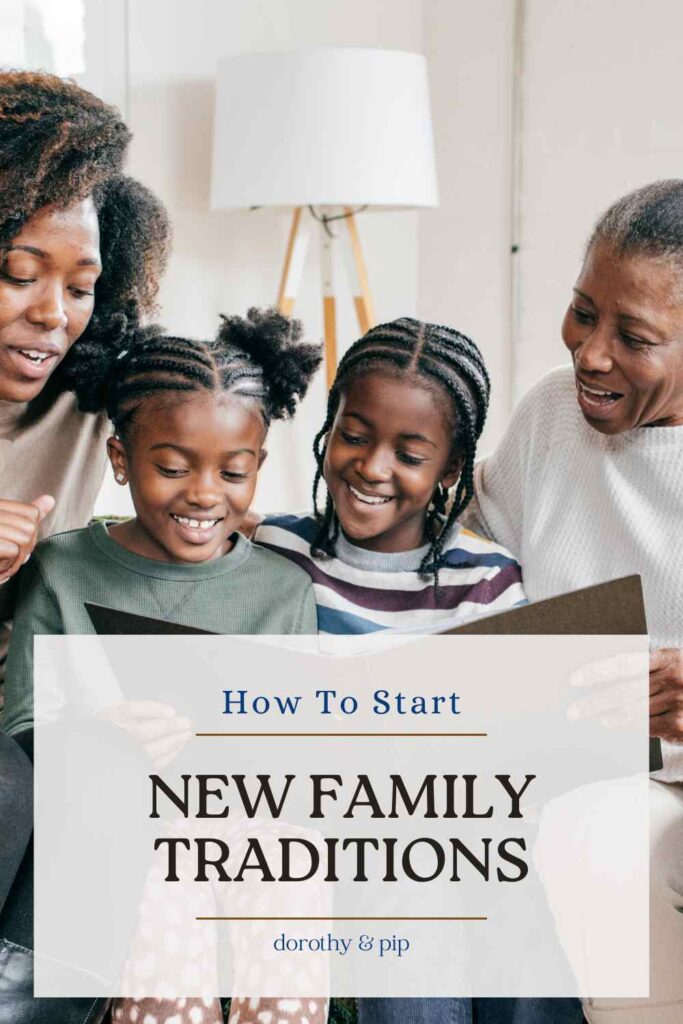Family traditions are the cherished rituals that bind us together, creating lasting memories and a sense of belonging.
In this guide, we’ll explore the significance of these traditions and provide practical tips on how to create and maintain them, enriching your family’s life with joy and connection.
The Importance of Family Traditions
Building Strong Family Bonds
Family traditions play a crucial role in building and maintaining strong family bonds.
These shared experiences foster a sense of unity and belonging, creating a supportive environment where every family member feels valued and connected.
- Creating a Sense of Belonging: Traditions help family members feel like an integral part of a larger unit. Whether it’s a weekly movie night or an annual holiday celebration, these rituals provide a regular reminder of the family’s unity.
- Strengthening Relationships: Participating in traditions requires interaction and collaboration, which can strengthen relationships among family members. These shared moments encourage communication, teamwork, and mutual support.
- Case Studies and Anecdotes: Consider the Smith family, who started a tradition of Friday pizza nights. This simple ritual not only gave them something to look forward to at the end of each week but also provided a consistent opportunity to catch up and enjoy each other’s company.
Creating Lifelong Memories
Traditions are the building blocks of our most cherished memories. They give us something to look forward to and look back on, creating a tapestry of shared experiences that define our family history.
- The Role of Traditions in Forming Lasting Memories: Engaging in the same activities year after year helps solidify these events in our minds. The repetition of traditions creates a strong sense of continuity and nostalgia.
- Examples of Cherished Family Traditions: From decorating the Christmas tree together to annual summer vacations, these activities become the highlights of our lives. The Johnson family’s tradition of making homemade ice cream every Fourth of July, for instance, is a memory their children will cherish forever.
Passing Down Values and Heritage
Family traditions serve as a conduit for passing down values, beliefs, and cultural heritage from one generation to the next.
They are a way to ensure that the essence of the family is preserved and celebrated.
- Preserving Cultural and Familial Heritage: Traditions rooted in cultural practices keep the family’s heritage alive. Celebrating specific holidays, cooking traditional dishes, or telling stories about ancestors help instill a sense of pride and identity.
- Teaching Children About Their Roots: Through traditions, children learn about their family’s history and values. This knowledge provides a sense of identity and continuity, helping them understand where they come from.
Providing Stability and Predictability
In a world full of change and uncertainty, family traditions offer a comforting sense of stability and predictability. They are the anchors that keep us grounded, especially during challenging times.
- Offering Comfort During Times of Change: Traditions can be particularly comforting during periods of transition, such as moving to a new home or dealing with the loss of a loved one. The familiarity of these rituals provides a sense of normalcy and reassurance.
- How Traditions Create a Sense of Security: Knowing that certain events or activities will occur regularly can make life feel more predictable and secure. This predictability is especially beneficial for children, who thrive on routine and structure.
Enhancing Family Identity
Family traditions contribute significantly to the development of a unique family identity. They help define who we are as a family and what we stand for, creating a narrative that is uniquely ours.
- How Traditions Shape Family Identity: Traditions reflect the values, interests, and personality of the family. Whether it’s a shared love for a particular sport or a passion for community service, these rituals highlight what makes the family special.
- Creating a Unique Family Narrative: Over time, the stories and memories associated with family traditions become a part of the family’s narrative. These stories are passed down through generations, enriching the family’s history and identity.
By understanding and embracing the importance of family traditions, we can intentionally create rituals that bring joy, connection, and meaning to our lives.

Types of Family Traditions
Daily Traditions
Daily traditions are small, routine activities that families engage in every day. Though seemingly minor, these rituals can have a significant impact on family cohesion and individual well-being.
- Bedtime Routines: Establishing a consistent bedtime routine, such as reading a story or sharing the day’s highlights, helps children wind down and feel secure. This routine also provides a precious opportunity for parents and children to bond.
- Family Meals: Eating meals together as a family, even if it’s just breakfast or dinner, creates a regular time for everyone to connect and communicate. These shared meals are opportunities to discuss daily experiences and reinforce family values.
Weekly Traditions
Weekly traditions offer a more substantial break from the daily grind, providing regular opportunities for families to spend quality time together.
- Family Game Nights: Setting aside one night a week for board games or card games encourages fun and interaction. This tradition fosters teamwork, communication, and healthy competition.
- Sunday Dinners: Many families gather for a special meal every Sunday, inviting extended family members and close friends. These dinners can become a cherished tradition, providing a consistent time to catch up and enjoy each other’s company.
Annual Traditions
Annual traditions are often the most memorable and anticipated. They mark the passage of time and celebrate significant events and milestones.
- Holiday Celebrations: Celebrating holidays like Christmas, Hanukkah, or Thanksgiving with unique family rituals makes these occasions special. Whether it’s baking cookies, decorating the house, or participating in religious services, these traditions enhance the festive spirit.
- Birthdays and Anniversaries: Creating special rituals for birthdays and anniversaries, such as a family breakfast in bed or a personalized birthday cake, makes these personal milestones feel even more significant and celebrated.
Milestone Traditions
Milestone traditions commemorate significant life events, providing a sense of achievement and continuity.
- Graduation Celebrations: Marking educational achievements with ceremonies, parties, or special outings honors the hard work and dedication involved. These celebrations create lasting memories and highlight the importance of education.
- Weddings and New Births: Traditions surrounding weddings and the arrival of new family members, such as bridal showers or baby naming ceremonies, bring the family together to celebrate these joyous occasions.
Cultural and Religious Traditions
Cultural and religious traditions connect families to their heritage and community, providing a sense of belonging and continuity.
- Celebrating Cultural Heritage: Engaging in cultural practices, such as traditional dances, music, or festivals, helps preserve and celebrate the family’s roots. These activities educate younger generations about their heritage and foster a sense of pride.
- Observing Religious Holidays and Rituals: Participating in religious traditions, such as attending services, praying together, or observing dietary restrictions, reinforces spiritual beliefs and creates a shared sense of purpose and faith.
By incorporating various types of traditions into family life, we can create a rich tapestry of experiences that strengthen bonds, celebrate heritage, and provide joy and stability.

How to Create and Maintain Family Traditions
Identifying Core Values
Creating meaningful family traditions starts with understanding what your family values most. These values will guide the types of traditions you establish and ensure they resonate with everyone involved.
- Understanding What Your Family Values: Sit down as a family and discuss what matters most to you. Is it spending quality time together, celebrating achievements, or honoring cultural heritage? Identifying these values will help you create traditions that are meaningful and impactful.
- Aligning Traditions with These Values: Once you’ve identified your core values, brainstorm traditions that reflect them. For example, if your family values community service, you might establish a tradition of volunteering at a local shelter during the holidays.
Starting Small
Introducing new traditions can be overwhelming, so it’s important to start small and gradually build from there. This approach makes it easier to integrate traditions into your routine and ensures they are sustainable.
- Tips for Introducing New Traditions: Begin with simple, manageable activities that don’t require extensive planning or resources. For instance, you might start with a weekly family movie night or a monthly baking day.
- How to Involve the Whole Family: Engage every family member in the process of creating and maintaining traditions. Allow each person to contribute ideas and take on responsibilities, ensuring everyone feels included and invested.
Consistency is Key
The power of traditions lies in their regularity. Consistency reinforces the importance of the activity and makes it a reliable part of family life.
- The Importance of Regularity: Choose specific times and dates for your traditions and stick to them as closely as possible. Consistent participation helps solidify the tradition and makes it a natural part of your routine.
- Strategies for Maintaining Traditions: Create reminders and schedules to help you stay on track. Setting calendar alerts or designating a family member to take charge of certain traditions can ensure they are consistently observed.
Flexibility and Adaptation
While consistency is important, it’s also crucial to be flexible and adapt traditions as needed. Families grow and change, and traditions should evolve to reflect these changes.
- Adjusting Traditions as Your Family Grows: As children grow older or new family members join, be open to modifying traditions to accommodate everyone’s needs and interests. This adaptability keeps traditions relevant and enjoyable for everyone.
- Balancing Tradition with Innovation: Don’t be afraid to introduce new elements to existing traditions or start entirely new ones. Balancing time-honored rituals with fresh ideas keeps family traditions exciting and meaningful.
Documenting and Celebrating Traditions
Preserving the memories associated with your family traditions can enhance their significance and ensure they are passed down through generations.
- Keeping a Family Tradition Journal: Document your traditions in a family journal, recording details about each event, including participants, activities, and memorable moments. This journal can become a treasured keepsake and a source of inspiration for future generations.
- Using Photos and Videos to Document Traditions: Capture your family traditions through photos and videos. Creating annual photo albums or video montages allows you to revisit these cherished memories and celebrate your family’s unique journey.
By following these steps, you can create and maintain family traditions that reflect your values, strengthen your bonds, and provide joy and stability for years to come.

Examples of Creative Family Traditions
Crafting Traditions
Crafting traditions provide a wonderful opportunity for families to unleash their creativity while spending quality time together. These activities can become cherished annual or seasonal rituals.
- Annual Family Craft Projects: Choose a large project that your family can work on together over time, such as building a treehouse, creating a family scrapbook, or making a quilt. Each year, add to the project, making it a living piece of family history.
- DIY Holiday Decorations: Create homemade decorations for holidays. Whether it’s crafting ornaments for the Christmas tree, making Halloween costumes, or designing Easter eggs, these activities become special memories and unique keepsakes.
Food and Cooking Traditions
Food has a special way of bringing people together. Establishing cooking and eating traditions can be both fun and delicious.
- Family Recipes and Cooking Nights: Dedicate one night a week or month to cooking a family recipe together. Share the stories behind these recipes and enjoy the process of making them as a team.
- Baking Days and Food-Related Traditions: Set aside specific days for baking treats, such as cookies, pies, or bread. These days can coincide with holidays or special events, adding an extra layer of celebration.
Outdoor and Adventure Traditions
Outdoor traditions encourage families to explore and appreciate nature together. These activities promote physical health and create a sense of adventure.
- Family Hikes and Camping Trips: Plan regular hikes or camping trips. These excursions provide a break from daily routines and an opportunity to bond in nature.
- Annual Vacations and Travel Traditions: Establish a tradition of taking an annual family vacation. Whether you visit the same place each year or explore new destinations, these trips create lasting memories and shared experiences.
Educational and Learning Traditions
Learning traditions help families grow together intellectually and emotionally. They can be fun and engaging while promoting continuous learning.
- Family Reading Nights: Choose a night each week to read together as a family. You can take turns reading aloud or have each person share their favorite book. This tradition fosters a love of reading and provides a quiet, bonding activity.
- Educational Trips and Museum Visits: Plan regular visits to museums, science centers, or historical sites. These outings are not only educational but also offer a chance to spend quality time together while discovering new interests.
Giving Back Traditions
Traditions that focus on giving back to the community help instill a sense of gratitude and social responsibility in family members.
- Volunteering as a Family: Find local volunteer opportunities that your family can participate in together, such as serving meals at a shelter, participating in community clean-up events, or helping at an animal rescue center.
- Charitable Traditions and Community Service: Create traditions around charitable activities, like organizing a family garage sale and donating the proceeds, or adopting a family in need during the holidays. These activities teach the importance of generosity and community involvement.
Incorporating creative family traditions into your routine can enhance your family’s connection, create lasting memories, and provide countless opportunities for fun and learning.

Overcoming Challenges in Maintaining Traditions
Time Constraints
In today’s fast-paced world, finding time to maintain family traditions can be challenging. However, with some planning and prioritization, it’s possible to make time for these important rituals.
- Managing Busy Schedules: Look at your family’s weekly schedule and identify gaps where traditions can fit. Even small windows of time can be used for meaningful activities. For instance, a 30-minute family walk after dinner can become a cherished tradition.
- Making Time for Traditions: Prioritize traditions by scheduling them into your calendar like any other important event. Treat these times as non-negotiable appointments to ensure they happen regularly.
Family Dynamics
Different interests and personalities within the family can sometimes make it difficult to agree on and maintain traditions. Finding common ground is key to ensuring everyone feels included and engaged.
- Dealing with Differing Interests: Involve everyone in the decision-making process to find activities that appeal to all family members. Rotate traditions so each person gets a chance to participate in something they enjoy.
- Ensuring Inclusivity and Participation: Encourage each family member to contribute ideas and take on roles within the traditions. This involvement helps everyone feel valued and invested in maintaining the traditions.
Changing Circumstances
Life is full of changes, and sometimes these can disrupt established traditions. Flexibility and adaptability are essential to keeping traditions alive during transitions.
- Adapting Traditions in Times of Change: Whether it’s moving to a new city, dealing with illness, or experiencing a significant life change, traditions can be modified to fit new circumstances. For example, if you move to a new home, adapt your holiday traditions to include exploring local festivities.
- Keeping Traditions Alive During Transitions: Use transitions as opportunities to create new traditions that reflect your current situation. This adaptability can make changes feel less daunting and help maintain a sense of continuity.
Maintaining Enthusiasm
Over time, traditions can become routine and lose their excitement. Keeping traditions fresh and engaging ensures they remain enjoyable and meaningful.
- Keeping Traditions Fun and Engaging: Add new elements to existing traditions or introduce variations to keep things interesting. For example, if your family has a tradition of watching movies on Fridays, introduce a theme night or let different family members pick the movie each week.
- Avoiding Burnout and Monotony: Be mindful of the frequency and complexity of your traditions to avoid feeling overwhelmed. It’s okay to scale back or take a break from certain traditions if they start to feel burdensome.
By addressing these challenges proactively, you can ensure that your family traditions remain a source of joy, connection, and stability, even in the face of obstacles.


